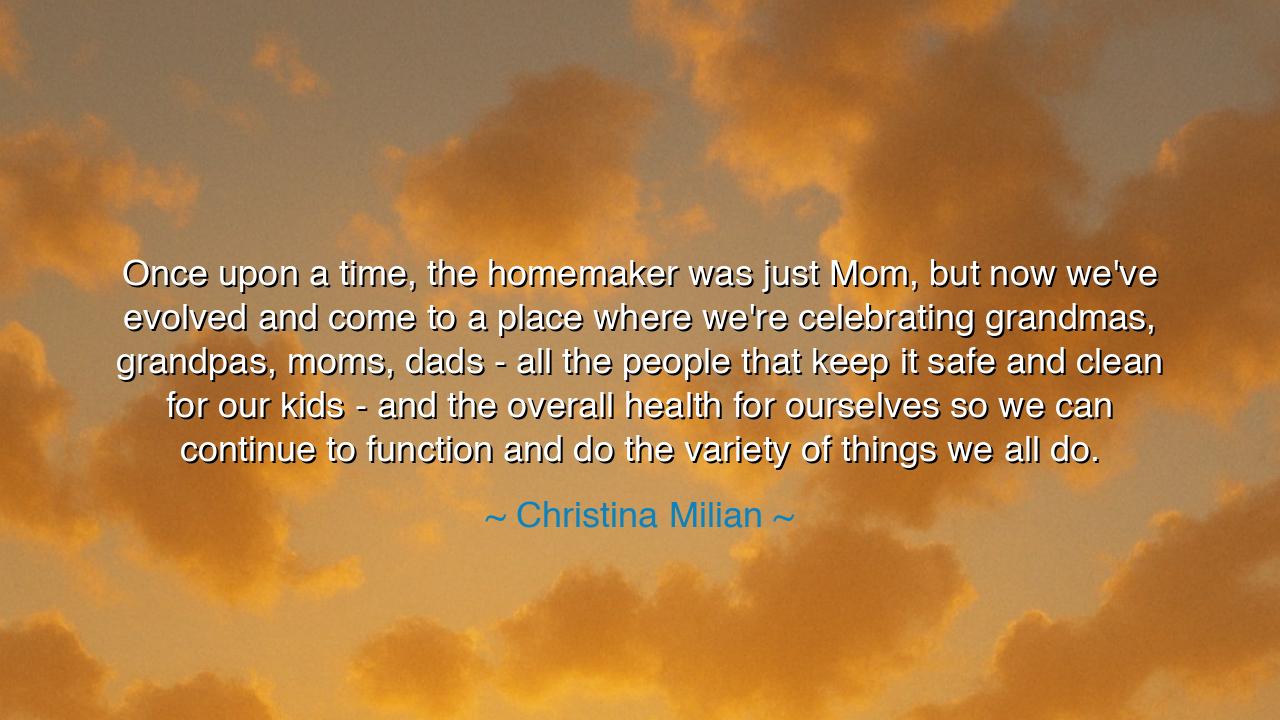
Once upon a time, the homemaker was just Mom, but now we've
Once upon a time, the homemaker was just Mom, but now we've evolved and come to a place where we're celebrating grandmas, grandpas, moms, dads - all the people that keep it safe and clean for our kids - and the overall health for ourselves so we can continue to function and do the variety of things we all do.






“Once upon a time, the homemaker was just Mom, but now we’ve evolved and come to a place where we’re celebrating grandmas, grandpas, moms, dads — all the people that keep it safe and clean for our kids — and the overall health for ourselves so we can continue to function and do the variety of things we all do.” – Christina Milian
In the gentle wisdom of these words, Christina Milian calls us to honor a truth as timeless as the hearth itself: that the labor of love which keeps a home alive is not bound by gender, nor age, nor title, but by care, unity, and devotion. Once, the mantle of the homemaker was placed solely upon the mother, as if she alone held the keys to warmth and order. But now, as the ages have turned and understanding has deepened, humanity has come to see what the ancients always knew — that the home is the foundation of civilization, and that all who tend it are guardians of life itself.
Long ago, in every tribe and village, the hearth fire was sacred. Around it gathered the old and the young, the strong and the frail. It was not the task of one, but of many. The grandmother stirred the pot; the father hunted and built; the mother wove and nurtured; the child brought laughter and learning. Together, they formed a circle of protection. Yet, in the march of modernity, we forgot this sacred circle. We confined the homemaker’s role to a single image — the mother alone, laboring unseen, her work unmeasured though the world turned upon it. Milian’s words are a song of rediscovery, a reminder that care is not weakness, and that every heart that serves the home strengthens the whole of humanity.
In our time, the definition of family has evolved, not by abandoning tradition, but by expanding it. Where once stood only the mother, now stand grandparents, fathers, partners, and even communities, all sharing in the sacred duty of nurturing. This is not mere social progress — it is spiritual evolution. To clean, to feed, to teach, to heal — these acts are not small, but divine. They are the unseen pillars that uphold the health and harmony of the world. In celebrating all caretakers, Milian reminds us that the truest measure of civilization is not in its wealth or power, but in how it honors those who care for others.
Consider the story of Eleanor Roosevelt, who transformed the concept of caregiving into leadership. Though a First Lady of great influence, she never ceased to serve — writing letters to soldiers, comforting the poor, advocating for children and workers. She expanded the idea of the “homemaker” to the scale of a nation, proving that to nurture, whether a home or a country, is not a private duty but a public calling. In her, we see Milian’s truth embodied: that when love and responsibility are shared, the world itself becomes a home.
But Milian’s words carry another layer of wisdom: the call to self-care. She reminds us that the caretakers, too, must tend to their own health — body, mind, and spirit. The fire that warms others cannot burn forever if not refueled. In the ancient temples of wisdom, it was taught that one cannot pour from an empty vessel. So must the modern homemaker — be they mother, father, or grandparent — find balance between giving and replenishing. This is not selfishness, but the foundation of endurance, the secret by which love sustains itself across generations.
Let us, then, honor those who labor quietly, who sweep the floors of chaos, who prepare the meals that nourish both stomach and soul. Let us see them not as invisible, but as heroes of the everyday. Their hands may never wield a sword or sign a decree, but they shape the destiny of the future through gentleness, through patience, through steadfast care. To keep a home clean and safe is to defend civilization itself, for from clean homes rise healthy minds, and from healthy minds rise peaceful societies.
Therefore, children of the future, learn this lesson: every act of care is an act of creation. Whether you raise a child, comfort an elder, or simply keep your space in order, you are participating in the sacred rhythm of life. Honor those who share this work beside you — the mothers, the fathers, the grandparents, the friends — for together you are the keepers of the flame. And remember always Milian’s wisdom: that the measure of our progress is not only in the machines we build or the wealth we gain, but in how tenderly we care for one another, and how wisely we sustain the hearth that nourishes us all.
For in the end, to love, protect, and nurture — these are the true labors of immortality, the works that outlast stone and steel. A clean home, a fed child, a healed heart — these are the silent victories upon which all greatness stands.






AAdministratorAdministrator
Welcome, honored guests. Please leave a comment, we will respond soon